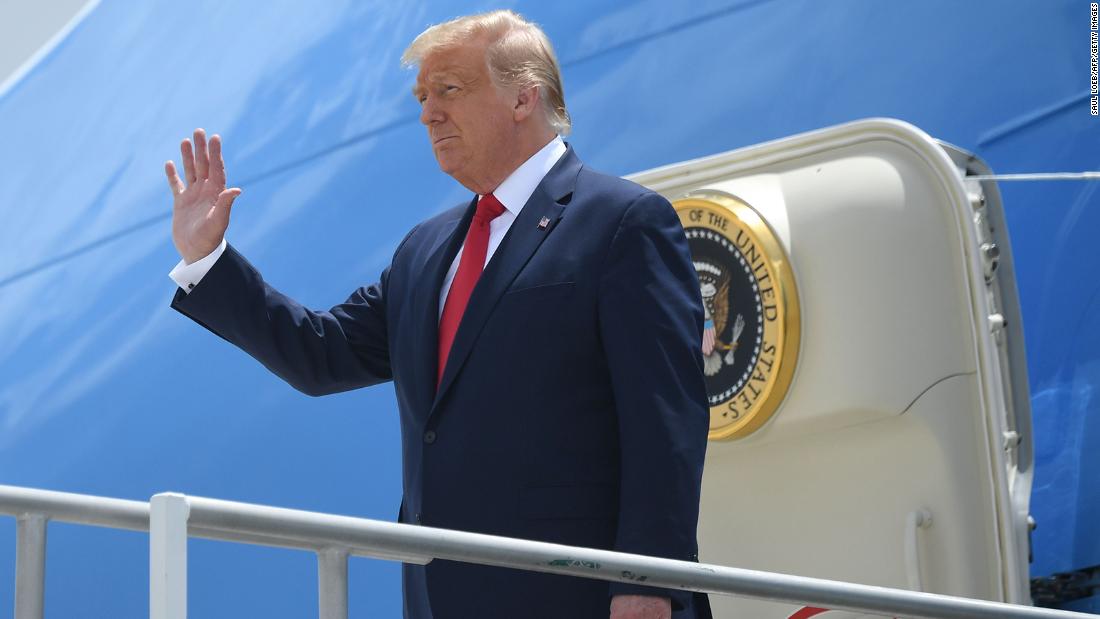Trump ignores the pandemic as he lands in virus hotspot
The trip, which includes a multimillion-dollar fundraiser and meetings, comes amid Trump’s larger push to get the US back into gear amid the pandemic. The President has been determined to project an image of normalcy, even as he heads into what’s been widely referred to as the new epicenter of the virus and the rest of the America is being discouraged from traveling, told to socially distance and encouraged to wear a mask.
A presidential visit — no matter who is in office — requires a significant amount of resources, with White House officials, White House Medical Unit representatives and US Secret Service agents traveling in advance of the president to coordinate with local officials on the ground. There is an extensive amount of medical preparation involved each time a president travels, with plans in place for the worst-case scenario.
After visiting Southern Command, the President participated in a roundtable with dissidents of communism and socialism in Latin America. Participants largely focused on warning against socialism and communism creeping into the United States, at times drawing parallels to Democrats and activists in the United States.
“Now Joe Biden and the radical left are trying to impose this same system, socialism plus in America. Biden is a puppet of Bernie Sanders, (Alexandria Ocasio-Cortez), the militant left, the people who want to rip down statues and monuments to George Washington, Thomas Jefferson, Benjamin Franklin,” Trump said, adding: “They want to rip down statues to Jesus.”
Like other White House events in recent weeks, this roundtable took place at a church, and it’s not clear if audience members were socially distanced. During similar events at churches held by the White House amid the pandemic, efforts to socially distance audience members had been mixed.
The President will round off his trip by participating in closed-door fundraiser — one of many events Trump and past presidents have used to secure support from high-dollar donors. The event is expected to raise $10 million. But it comes after supporters slated to attend a fundraiser with the vice president just on Thursday tested positive for the coronavirus and were asked to leave before he arrived.
Trump’s public appearances within the White House this week also appeared to be part of efforts to return to normal amid the pandemic, focusing on returning children back to school amidst the pandemic, signing a major trade deal, and enhancing “Hispanic prosperity.”
And during a roundtable and Rose Garden ceremony to establish the “Hispanic Prosperity Initiative” on Thursday, mentions of the coronavirus’ impact on Latinos were infrequent. One roundtable participant called the coronavirus’ impact on the economy a “blip.”
During an executive order signing, Trump touted his administration’s efforts on the coronavirus, but never mentioned its health impacts on the Hispanic community.
At the White House events focused on Hispanics on Thursday, there was also no mention of the recent surge of coronavirus cases and deaths in states across the sunbelt, which have some of the largest Latino populations in the country.
In Texas, statewide Hispanic coronavirus cases are proportionate to their population. But in individual cities, such as Dallas, Texas, the Hispanic community is seeing a disproportionate impact.
However, there are some signs that the President, the White House and his campaign are trying to adjust to the new realities of coronavirus.
“You’re in a hospital setting, I think it’s a very appropriate thing,” the President said on Thursday. “I have no problem with a mask.”
Trump explained that “if I’m with soldiers, people that — you know, I don’t want to spread anything.”
And the campaign is planning to make changes to its upcoming rally in New Hampshire, his second since the pandemic began.
The rally was scheduled to take place this weekend, but White House press secretary Kayleigh McEnany said Friday that it had been pushed back because of an incoming storm.
CNN’s Ashley Killough, Fredreka Schouten and Betsy Klein contributed to this report.
![]()


